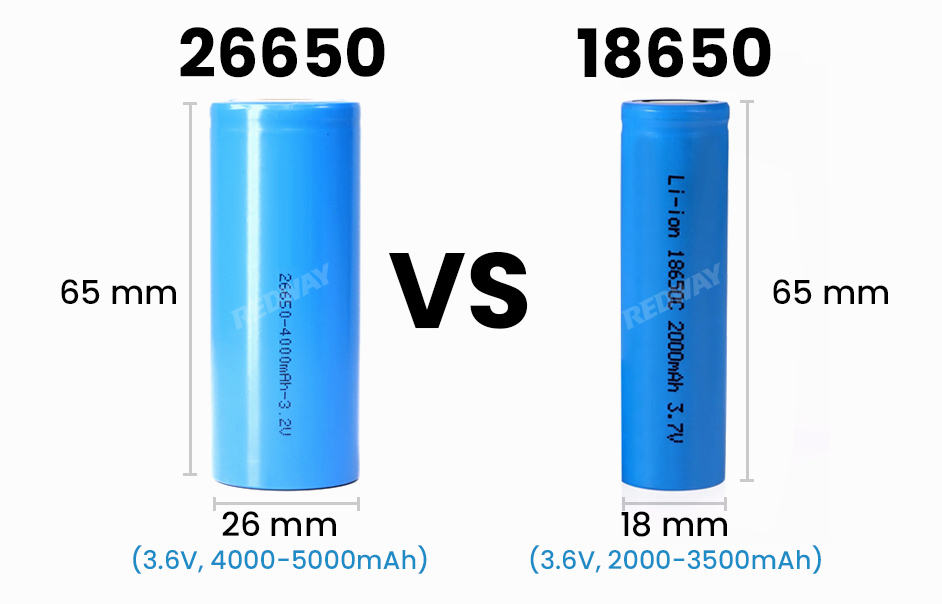
Redway Power, a leading authority in battery technology, sheds light on the key distinctions between 26650 and 18650 lithium batteries, providing valuable insights into their specifications, applications, and compatibility. As the demand for high-performance energy solutions continues to rise, understanding the nuances between these two battery types becomes essential for consumers and industry professionals alike.
Size and Specifications:
The 26650 battery, named for its dimensions of 26mm in diameter and 65mm in length, boasts larger physical proportions compared to the widely used 18650 battery, which measures 18mm in diameter and 65mm in length. Despite their size disparity, both batteries operate within similar voltage ranges, with 26650 batteries typically delivering around 3.6 volts, while 18650 batteries range from 3.6 to 3.7 volts. Moreover, 26650 batteries generally offer a larger capacity, ranging from 4000 to 5000mAh, compared to the 2000 to 3500mAh capacity of 18650 batteries.
Applications and Performance:
The choice between 26650 and 18650 batteries hinges on specific application requirements. 26650 batteries excel in scenarios demanding extended power and durability, making them ideal for high-powered flashlights, electric vehicles, and certain power tools. Their larger size and higher capacity allow for more energy storage, catering to the demands of power-intensive devices and systems across various industries. On the other hand, 18650 batteries, known for their versatility and widespread use, power a diverse array of electronic devices, including laptops, flashlights, vaping devices, and power tools. Their compact size and reasonable energy density make them ideal for portable electronics and applications where a balance of size and power is crucial.
Compatibility and Safety Considerations:
While both battery types offer distinct advantages, it’s essential to consider compatibility and safety factors when choosing between them. Devices must be designed to accommodate the larger size of 26650 batteries, whereas 18650 batteries are more compact and compatible with a broader range of devices. Additionally, mixing 26650 and 18650 batteries in the same device is not recommended due to differences in size, capacity, and voltage, which could lead to uneven discharge rates or safety hazards. It’s crucial to follow the manufacturer’s guidelines and use batteries explicitly compatible with the device to ensure proper performance, safety, and longevity.
Redway Power’s Expert Insights:
As a trusted authority in battery technology, Redway Power provides expert insights into the nuanced differences between 26650 and 18650 lithium batteries. By elucidating their specifications, applications, and compatibility considerations, Redway Power empowers consumers and industry professionals to make informed decisions when selecting the most suitable energy storage solution for their needs. With a commitment to quality, reliability, and innovation, Redway Power continues to lead the way in delivering cutting-edge battery solutions tailored to meet the evolving demands of modern technology.
Frequently Asked Questions (FAQs):
-
Are 26650 batteries better than 18650? It depends on your specific needs. 26650 batteries typically offer higher capacity and longer runtime compared to 18650 batteries. However, they are also larger and heavier, which may not be suitable for all applications.
-
What is the use of 26650 battery? 26650 batteries are commonly used in high-drain devices such as flashlights, power tools, electric vehicles, and other portable electronics where longer runtime and higher capacity are desired.
-
Why are 18650 batteries so popular? 18650 batteries are popular due to their versatility, widespread availability, and compatibility with a wide range of devices such as laptops, flashlights, vaporizers, and power banks.
-
Can I replace 18650 with 26650? In some cases, yes, you can replace 18650 batteries with 26650 batteries if the device can accommodate the larger size and higher voltage of the 26650 battery. However, it’s essential to check the device’s specifications and compatibility before making the switch.
-
What is the best protected 26650 battery? The “best” protected 26650 battery can vary depending on factors such as capacity, brand reputation, and specific requirements of your device. Some popular brands known for high-quality 26650 batteries include Panasonic, LG, Samsung, and Sony.
In conclusion, understanding the disparities between 26650 and 18650 lithium batteries is paramount for optimizing performance and efficiency across various applications. Redway Power’s comprehensive overview serves as a valuable resource for navigating the complexities of battery selection, ensuring that consumers and industry professionals alike can harness the full potential of these advanced energy storage solutions.
For more information, visit Redway Power’s website at https://www.redwaypower.com/26650-vs-18650-lithium-battery-what-are-the-differences/
Media Contact
Company Name: Redway Power, Inc.
Contact Person: Mr. Smith
Email: Send Email
Phone: +86 (755) 28010506
City: Shenzhen
State: Guangdong
Country: China
Website: https://www.redwaypower.com/
